Key takeaways:
- Digital citizenship involves navigating online spaces with respect, responsibility, and empathy, highlighting the importance of understanding others’ feelings behind screens.
- Key principles include respect, responsibility, and digital literacy, which are essential for fostering positive online interactions and critical evaluation of information.
- Active engagement in community initiatives through digital platforms demonstrates the potential for individuals to effect positive change online.
- Promoting digital citizenship requires effective tools, such as discussion platforms and interactive curricula, to teach students responsible online behavior and critical thinking skills.
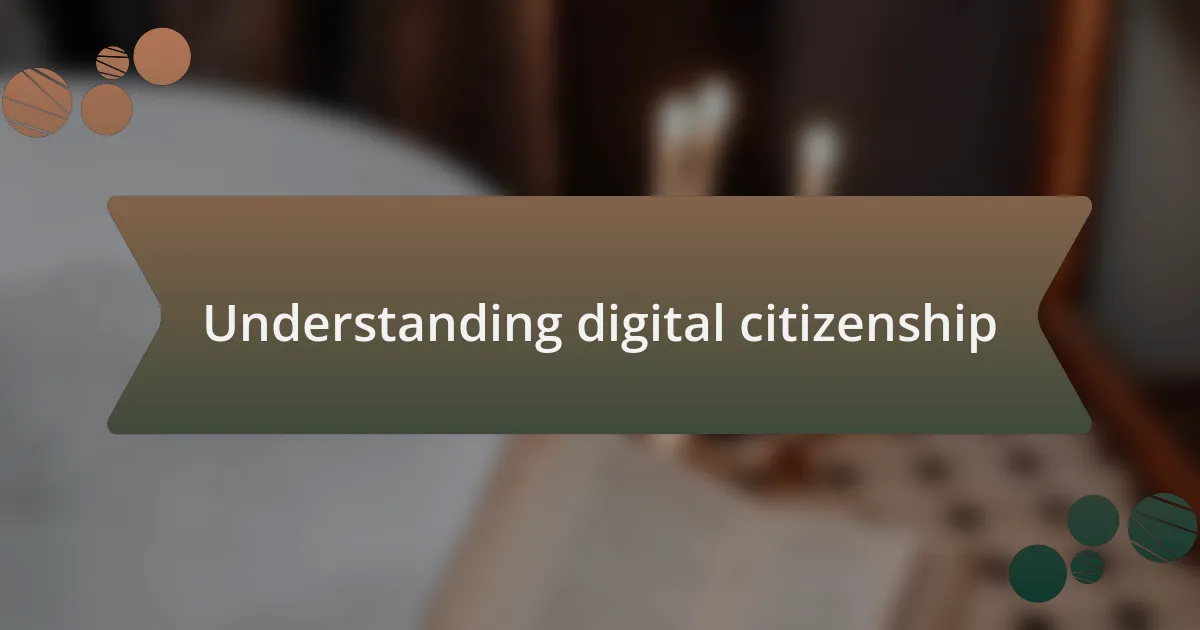
Understanding digital citizenship
Digital citizenship is about navigating the online world with respect and responsibility. I remember my early days exploring the internet—I stumbled upon forums where discussions could quickly turn toxic, and I felt uneasy about joining in. This experience taught me that engaging online requires mindfulness and empathy, as our words carry weight, sometimes even more than face-to-face conversations.
One aspect of digital citizenship that resonates with me is the importance of digital literacy. It’s not just about understanding how to use technology but also knowing how to critically evaluate information. I once fell down a rabbit hole of misinformation during a heated debate online, which made me question everything I read afterward. Have you ever been misled by something you thought was factual? That moment pushed me to become an informed digital consumer, verifying sources and questioning the validity of what I encounter.
Moreover, the concept of digital citizenship emphasizes the need for digital etiquette. I recall a time when I witnessed a friend receiving harsh comments on social media for an innocent post. It struck me how easily we can forget our humanity in the vastness of the digital space. This experience serves as a reminder that behind every screen is a real person with feelings—something we should never lose sight of as we traverse our online lives.
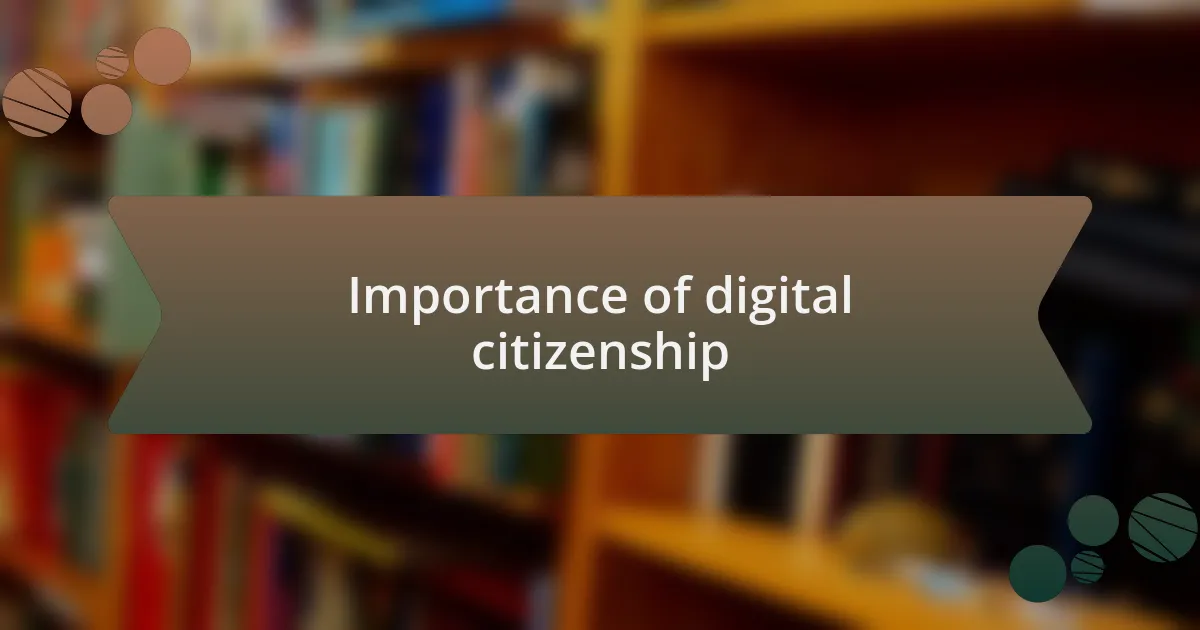
Importance of digital citizenship
Digital citizenship is vital because it shapes our interactions and influences the online environment we all share. I recall a time when a simple misunderstanding in a group chat escalated due to miscommunication. This experience highlighted how vital understanding digital nuances is; without it, we risk creating conflict instead of fostering dialogue. It reminds me of just how interconnected we are, and why every online interaction counts.
Understanding digital citizenship also helps foster a safer online community. I remember when my younger sibling faced cyberbullying for expressing their thoughts freely in an online gaming forum. Watching them struggle was difficult, yet it strengthened my belief that educating ourselves and others about respectful conduct online is crucial. Wouldn’t it be better if we all made an effort to protect one another and promote kindness instead?
Lastly, digital citizenship reinforces the role of active engagement in our communities. I’ve seen online advocacy campaigns spark significant change, like when local activists used social media to organize a charity drive. This showed me that each one of us has the power to make a difference through our online presence, and it’s our responsibility to harness that potential thoughtfully. What if we leveraged our digital platforms not just for sharing, but for uplifting others?
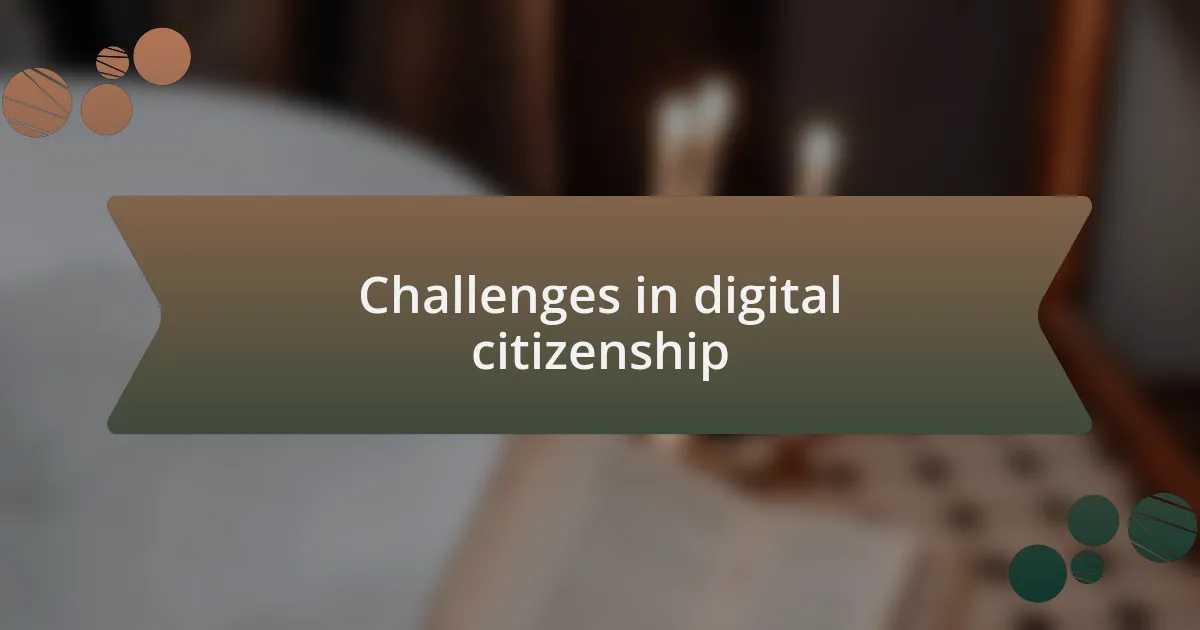
Challenges in digital citizenship
Navigating the digital landscape comes with its own set of challenges. For instance, I’ve often found myself grappling with misinformation that spreads like wildfire online. It leaves me wondering: how can we discern fact from fiction in a sea of opinions? This is particularly tough for younger users, who might not have the experience to question what they encounter.
Privacy issues also loom large in digital citizenship. I once learned the hard way about oversharing personal information on social media. A simple vacation post attracted unwanted attention and taught me that what feels harmless can actually compromise our safety. How many of us have stopped to think about the potential repercussions of our digital footprints?
Moreover, online harassment and bullying are pervasive issues that can deeply impact individuals. I remember a friend who faced relentless negativity in the comments section of their blog. It made me reflect on the importance of fostering a culture of respect and empathy in our digital interactions. What if we all chose to uplift rather than tear down? Embracing this mindset could significantly change the online experience for everyone.
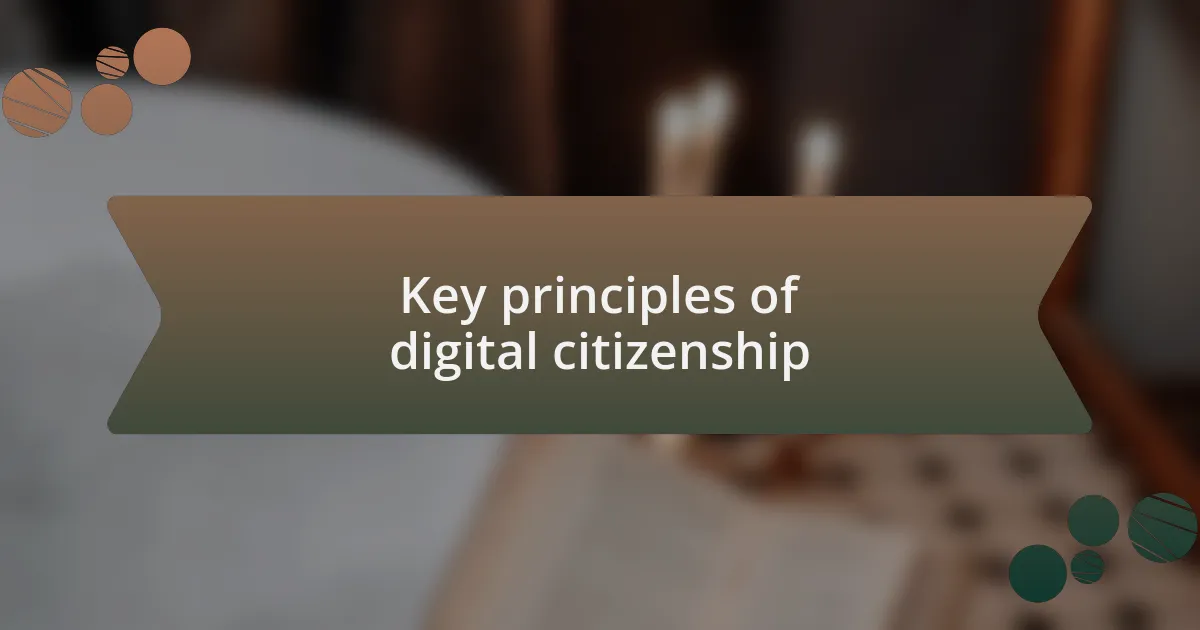
Key principles of digital citizenship
When we talk about digital citizenship, one fundamental principle is respect. I recall a discussion I had with a group of students about the importance of treating others online as we would in person. It struck me how often people forget that behind every screen is a real person with feelings. Isn’t it interesting how this simple idea can transform the way conversations unfold in digital spaces?
Responsibility also plays a crucial role. I remember my initial foray into blogging; I underestimated the impact of my words. A controversial post sparked significant debate, and I realized that I had a responsibility to consider my audience’s perspectives. How often do we pause to think about the influence our digital actions can have on others?
Lastly, digital literacy stands out as an essential principle. Often, I see people sharing articles without checking the source or the veracity of the information. I firmly believe that developing critical thinking skills in this context is vital. After all, how can we empower ourselves and others to navigate the digital world effectively if we cannot identify credible information?
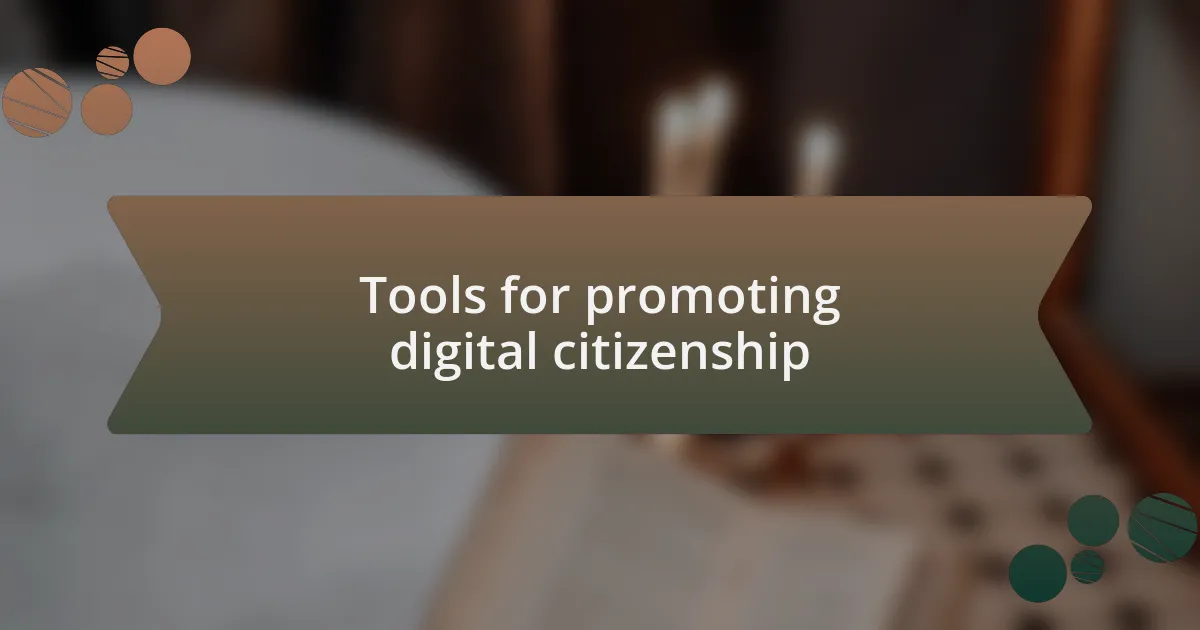
Tools for promoting digital citizenship
Creating a culture of digital citizenship requires effective tools that facilitate responsible online behavior. One resource I’ve come across is discussion platforms, such as online forums or group chats, where students can engage in respectful debates. I remember guiding a class through a carefully monitored debate, and witnessing how these tools encouraged them to articulate their thoughts and listen to differing opinions. It was a powerful way to illustrate the importance of civil discourse.
In my experience, interactive digital citizenship curriculum resources also play a pivotal role. Programs that integrate gamification, like quizzes and simulations, not only engage learners but also make the complexities of online etiquette more relatable. I once facilitated a workshop using a game designed to confront students with scenarios about digital dilemmas. Watching their excitement while they navigated these challenges highlighted how tools can actively teach responsibility and critical thinking in a supportive environment.
Social media management tools are another innovative way to promote digital citizenship. By using platforms that allow students to curate and publish content responsibly, they learn firsthand the implications of their digital footprints. I recall how one project involved students creating their blogs, where they had to think critically about their audience and the message they wanted to convey. It was amazing to see them take ownership of their digital presence, reflecting on how they wanted to be perceived in the digital world. How could we not appreciate the growth that comes from such empowering experiences?
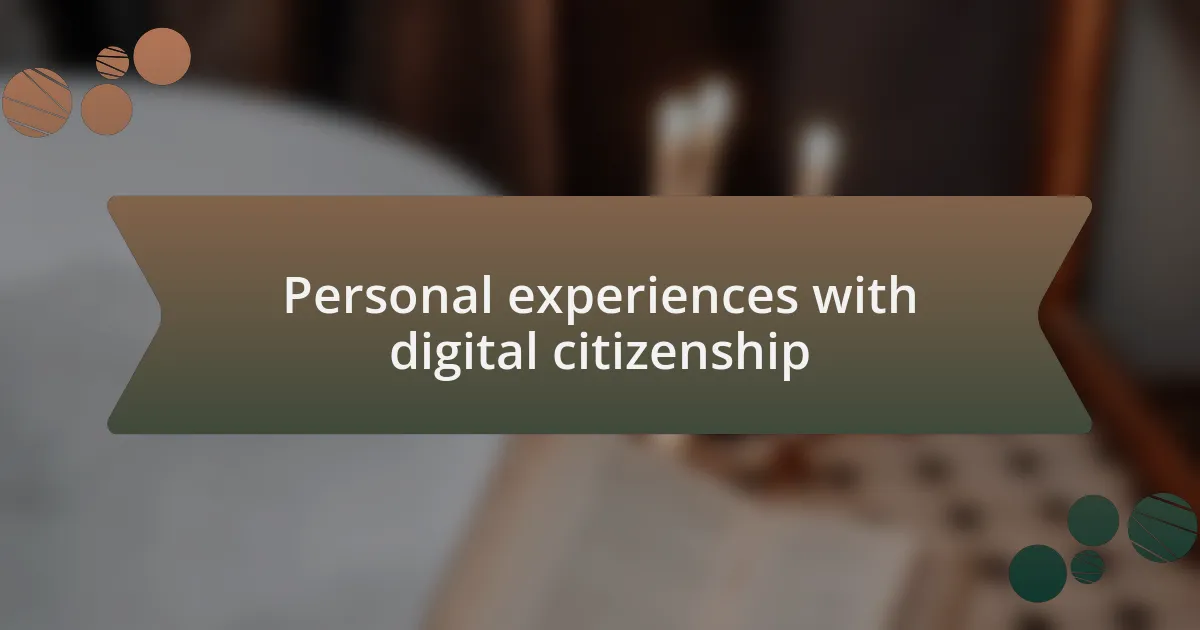
Personal experiences with digital citizenship
When I first introduced the concept of digital citizenship to my students, I was amazed by their reactions. They had so many questions about online behavior and its consequences. This curiosity made me realize how crucial it is to create a safe space for such discussions, enabling them to voice their experiences and concerns without judgment.
One particular incident stands out in my memory. A student shared a story about a misunderstanding that arose from a social media post. The way they articulated their feelings of embarrassment and confusion was a powerful reminder of the emotional weight our digital actions can carry. It made me reflect on how essential it is to teach not just the rules of engagement but also to foster empathy and understanding in digital interactions.
As I encouraged students to reflect on their online footprints, I noticed a shift in their attitudes. They began to take more responsibility for their digital presence. Seeing them engage thoughtfully with their peers, pondering their words before hitting “send,” was incredibly rewarding. It made me think—how can we cultivate this awareness in future generations, ensuring they navigate the digital landscape with confidence and respect?
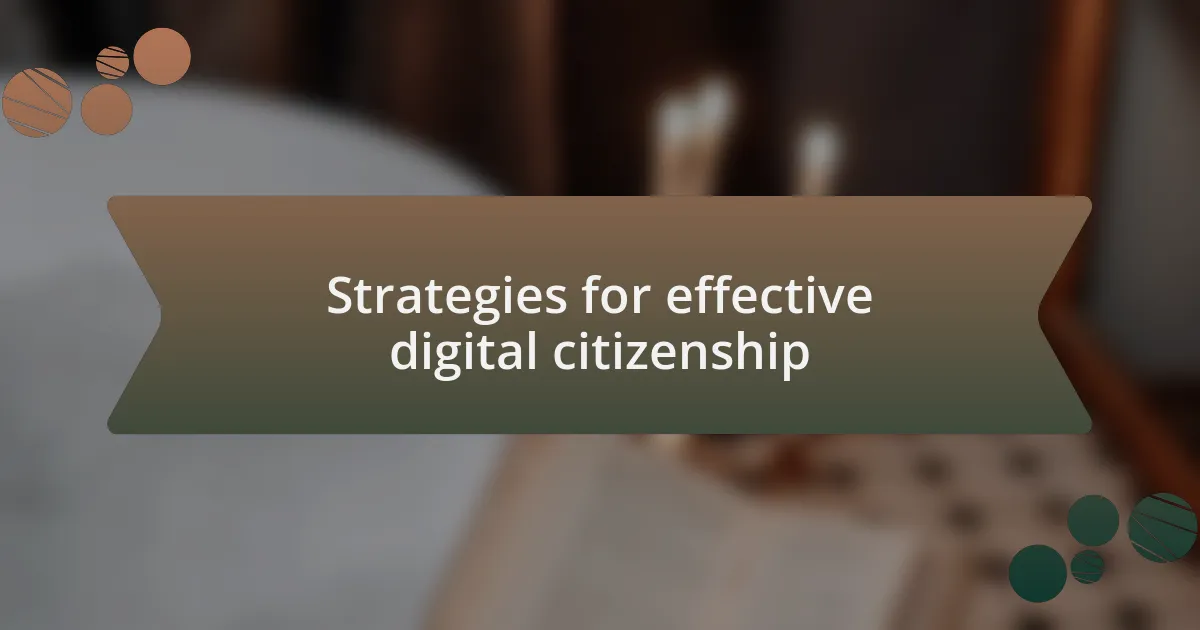
Strategies for effective digital citizenship
One effective strategy for promoting digital citizenship is to model healthy online behavior. I remember the first time I shared my personal experiences about missteps I made in the digital world—like getting into a heated debate that escalated unnecessarily. This vulnerability not only opened up a dialogue with my students but also illustrated the importance of remaining calm and respectful online, even when emotions run high. Why not share your own stories? Authenticity can bridge gaps and inspire others to reflect on their actions.
Another strategy I found impactful is integrating discussions about digital etiquette into everyday lessons. I often incorporate scenarios into class discussions, where students role-play different online situations—like receiving a negative comment on a post. This not only makes them think critically about their responses but also helps them empathize with others’ perspectives. Isn’t it fascinating how a simple exercise can empower them to respond thoughtfully in real-life contexts?
Finally, encouraging students to curate their digital footprints actively is paramount. I often challenge them to think about their online presence by asking, “What story does your social media tell about you?” When students take the time to curate their profiles mindfully, they begin to understand the long-term effects of their digital actions. Through these practices, I’ve witnessed them developing a sense of accountability and pride in their online reputations. Can there be a more rewarding outcome than helping them build a positive digital identity?